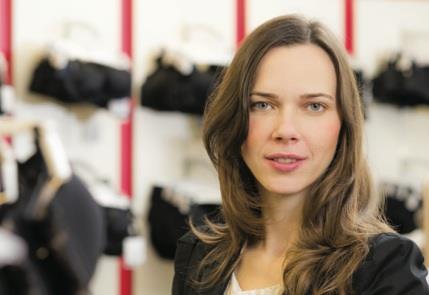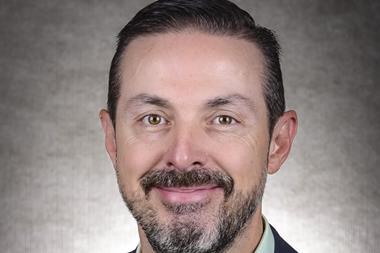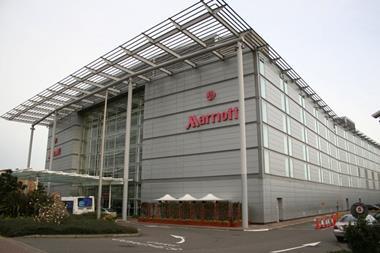There’s more to the lingerie industry than meets the eye and, as Triumph’s global head of insurance reveals, the key to successful risk management lies in communication

When it comes to managing risk in the fashion business, the secret of success is to remember that talking is good. “In the end, you have to be very honest and tell people what you think,” says lingerie firm Triumph’s global head of insurance Sabrina Hartusch. “You need to understand that you may not always have the final say, but you need to make your voice heard. It’s vital that everyone knows you, knows what you do and knows to trust you.”
Throughout her interview with StrategicRISK, Hartusch constantly stresses the importance of taking a person-to-person approach to risk management. She has been charged with helping lead a new approach to risk at Triumph, which, after being around for 126 years, has started to establish a formal risk management function - and bringing this new approach to every corner of what is a huge company is a challenge.
Triumph is one of the world’s largest multinational intimate apparel companies. It is present in more than 120 countries, with the core brands Triumph, Sloggi, Valisère, and HOM. Internationally, Triumph serves 40,000 wholesale customers, sells its products in more than 2,000 Triumph stores, employs in excess off 36,000 people and achieved revenues of SFR2bn (€1.7bn) in 2011.
Hartusch believes that good communication is vital in carrying out her work at the company, and she prides herself on maintaining strong working relationships with stakeholders across the business.
“Our operations stretch across manufacturing, wholesale and retail in many countries,” she says. “We have a lot of property. Although our core business is intimate apparel, and we have never deviated from that, it is a complex company.”
Hartusch’s specific responsibility is global insurance. “My mission is to safeguard the Triumph business through the optimisation of all global and local insurances and, by that, my objective is to minimise the negative cash impact on Triumph globally by having adequate and cost-efficient insurance in place. We look at increasing overall value and minimising current and future enterprise risk.” She reports to the chief financial officer, who is a board member.
‘Being embedded where I am gives me an understanding of all aspects of the business’
Sabrina Hartusch Triumph
“My desk is in the finance and administration department, and I share the space with colleagues in accounting, financial reporting, tax and treasury,” Hartusch says. “This is something that helps build a closeness and easy communication that is essential for ongoing project work and daily work. When looking outwards to the countries in which we operate, my point of contact is always the local financial director. We have regular meetings and regular telephone conversations. It’s vital that we all stay close.”
Global overview
Of course, managing insurance across such a large company means having an up-to-date overview of the issues affecting the many specialist areas of operations. “There are many different people whom I must understand and represent,” Hartusch says. “I deal with all insurances and that means all legal entity and all personnel insurances. This means talking to different people with different specialities. If its a factory audit, I talk to the engineers and health and safety; a legal issue and I talk to our lawyers; for personnel insurances there is a close collaboration with human resources. You have to be able to talk the language of everyone from engineers to brand managers with equal ease.”
As an example, Hartusch cites their response to a big mudslide at their Brazilian factory. “It really caused substantial damage and knocked the plant offline,” she says. “This disturbed our plan for months and we had to act quickly and decisively. In insurance, we did our bit co-ordinating the response. But it was the engineers who did the hard work: they knew what they were doing on the ground. They cleared the mud, cleaned the machines and got the factory back up and running. The experience really brought home to me the importance of having good relationships within the company; knowing who to talk to and who has the skills you need when you need them.
“This was possible only because of the relationship of trust I have built up in my four-and-a-half years at Triumph. The more I am known, the more people will contact me and volunteer information and the better I am able to ensure we are all working together to minimise risk. If you lean back, nothing will happen. You have to be proactive and foresee things. You have to have a broad view and an eye for detail.”
This is especially true in relation to her work helping establish the new risk function at Triumph. “This is something that is still in development at Triumph, but we are building it up year on year,” Hartusch says. “We think it is vital to introduce risk management by linking it to the idea of adding value, and so dispel any sense that we are just creating another head office function.”
Manyfold strategy
The Triumph strategy for achieving this is threefold. Hartusch says: “First, we tie risk in with group strategy and objectives. Second, we relate risk management to important, strategically critical projects where it is vital to have a good understanding of risk to ensure project success. Eventually, from there, we aim to reach out to the entire organisation.” She believes this is the best way to give employees across the company confidence to make risk management a formal part of their job and not just seem like an imposition. “You need to give people confidence and be an enabler for success”, she says. “It’s critical that people know and trust you, once you achieve that, change takes on its own dynamic; when it flies, it flies. But it can take years to wire formal risk awareness into a company’s culture and DNA.”
But Hartusch is ready for the challenge. “I have one of the best jobs in the company. It’s very diverse, there’s lots to read and learn and a wide range of tasks requiring different skills. Being embedded where I am gives me an understanding of all aspects of the business, from sales to finance, while still getting a strong sense of the mission.
“In the end, we market and sell underwear. And that is absolutely everything.”
Label and quality are vital
“Labelling is a risk we take very seriously,” Hartusch says. “Although people often cut out the label, it’s essential manufacturers include all the correct information.” Labelling is a legal requirement in most countries, although the information included and how it is presented can differ, “which has implications for manufacturing, wholesale and retail”.
Hartusch says: “With underwear, only the absolute finest quality will do. Underwear is worn next to the skin and we have to insist on the best, from materials to manufacture. Thus, it is essential we hold on to high-quality labour, and ensure our people stay with us. Unlike many retailers that merely buy garments and put on their labels, we make the majority ourselves.”
“Fashion is all about timing.
“Our business is always changing; there are different seasons and trends. We need to have the right product in the right place, at the right time, and that is a challenge. We have to plan ahead with accuracy because if we don’t sell all our Christmas bras, we’re stuck with a full warehouse.”
“Fake products are a headache. We see bootlegged products sold with our labels. This is misleading for customers, and inferior products also damage our brand and there is a loss of sales. We take our intellectual property seriously.” Proactive intelligence and effective liaison with law enforcement are necessary to identify where street sales are taking place, and where counterfeit goods are wholesaled and manufactured.
CV
- Born in Germany in 1981, Hartusch speaks fluent English plus basic French and Spanish.
- She studied for a BA in Mannheim, Germany, before moving to Cass Business School, City University, London, where she graduated with distinction as a Master of Science in insurance and risk management in 2006. She gained her Associateship of the Chartered Insurance Institute in 2007. She is currently undertaking the Fellowship of the Chartered Insurance Institute.
- Hartusch began her career at MLP Private Finance in Germany and London in 2001, before going on to work at Allianz Insurance, Guildford/London, as an assistant underwriter. She has been global head of insurance at Triumph International since 2008.
- She has also been a board member of the Swiss Association of Insurance and Risk Managers, with responsibility for international relations (Ferma) since 2009.




















No comments yet